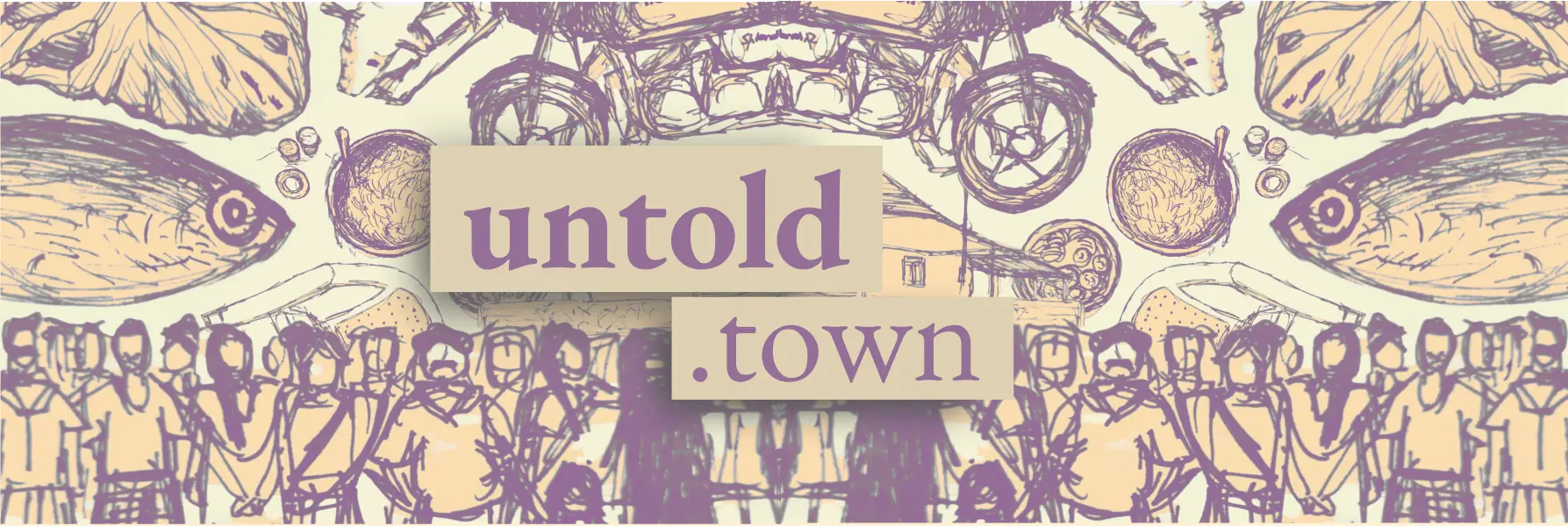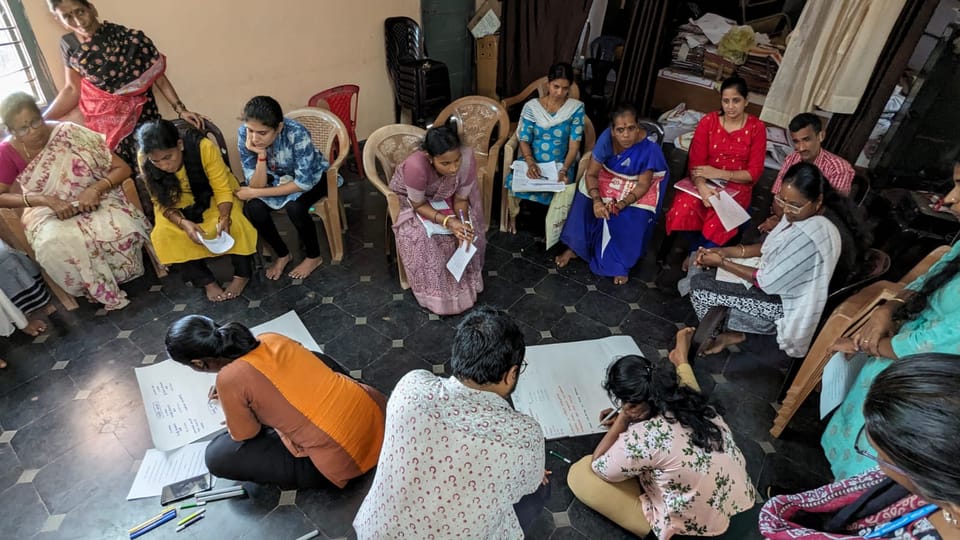Samagra Arogya is a long-term place-based collaborative engagement to understand and respond to Social Determinants of Health at the Gram Panchayat level. First phase was initiated through a collaboration between KHPT and Design Beku situated in Samagra Arogya GP cluster (7 Grama Panchayats in Kundapura Taluk namely Vandse, Idur Kunjadi, Hemmadi, Hakladi, Chittur, Aluru, and Keradi). The first phase concluded in March 2024.
The second phase of Samagra Arogya commenced in May 2024 by Aruvu Collaboratory and KHPT, along with communities, elected representatives and PRIs in Samagra Arogya GP Cluster. We continued to engage incorporating and reflecting on the learnings from first phase to co-envision, to foster care-based practices in local self-governance systems in the Gram Panchayat regions. All actions of Aruvu are carried out through the ‘structure of engagement’ co-developed by its transdisciplinary team for Samagra Arogya to learn and visiblise the differential needs of the communities, co-designing people-centric interventions with communities and Gram Panchayat, creating moments to learn, adapt and advocate newer governance systems attuned to the place and its people in the GPs. The modes of engagement are of various forms such as codesign sessions, artefacts, fellowships, Community Mesh Network, Participatory Geospatial Lab, Incubation of local enterprises, and so on.
We envision each Gram Panchayat to be an autonomous, decentralised entity that carries out a continuous and sustained practice driven responses by participatory action research to understand the historic and emerging needs of their communities, to plan and iteratively implement interventions.
Samagra Arogya Work Structure
WG1: Observatory
Establish location-based observatories for SDoH. Identify and expand understanding of “Micro-contexts” to guide interventions.
WG2: Care-based Interventions
Build networks with specific communities.
Prototype and implement local interventions in collaboration with WG1.
WG3: LeAd Advocacy - Learning Adaptation & Advocacy
Create resources and activities to translate WG1 & WG2's work into action.
Advocate for the sustainability and financial autonomy of interventions.
WG4: Orientation, Ethics & Refusal
Foster ethical research practices.
Ensure data protection and safe practices.
WG5: Coordination, Reporting & Management
Oversee project management, staffing, and resource allocation.
Facilitate periodic oversight and strategic utilisation of documentation.
WP01: Community Led Actions
Foster community-led actions to integrate the Samagra Arogya vision.
Develop components like the Place-based Glossary of SDoH, GP Dashboard, and Lived Experiences Library.
WP02: Cluster Level Governance
Facilitate cluster-level initiatives to address SDoH.
Enable inclusive and transparent decision-making processes.
WP03: Scaling-out of SA Structure
Initiate scaling-out within Vandse and other districts.
Establish collaborations and maintain a repository of methods for continuous learning.
Some Current works
Grama Drishti Dashboard


Grama Drishti Fellowships
The Grama Drishti fellowship is an engagement to build an environment with inclusive growth which will enable young people from the SA cluster to identify and address the specific, local manifestations of Social Determinants of Health as part of local governance efforts. Grama Drishti fellowship is a platform for young people of the region to work on joints efforts to advocate for their region. The fellows will be oriented to Samgra Arogya through an approach of practice-driven and place-based approach, with the desire that they will continue to engage in the place to carry forward the SA work and initiatives.
Objectives
- To develop a group of young people to actively participate in understanding and addressing local manifestations of SDoH through creative practice and critical engagement with the local governance structures and stakeholders of the place.
- To create a safe-space of practice-driven, place-based learning, that fosters creative confidence among the fellows to understand, make-visible and lead actions to address collectively.
- To foster collective experimentation with emerging technological infrastructure enabling community participation in local governance.
- This includes the abilities to work with and learn technological approaches of qualitative and quantitative data collection and visualisation, as well as abilities of sensemaking and sharing with community members.
Community Palliative Care (CPC) Initiative
The vision of Samagra Arogya: Community Palliative Program is to provide geriatric and palliative care services for elderly population, People with Disabilities, People suffering from Terminal diseases and post-surgical care at home with special focus on Social determinants of health (SDoH). The specific objectives of Samagra Arogya: Community Palliative Care Program are:
- Providing holistic and decentralised care to the identified individuals by bringing together medical professionals, Community Health research organisations and panchayat members to:
- Medical & nursing:This includes offering medical and nursing services to help relieve patient and family suffering through evaluations of physical and psychological. They provide symptom management, Physiotherapy, Occupational Therapy, educate families about the illness and provide support and comfort.
- Emotional & mental wellbeing: This includes addressing the worries, anxiety and concerns of the patients and their families and honouring the family’s beliefs systems, helping them cope with symptoms of trauma.
- Nutrition & food:This includes suggestions to patients and families on foods and related ideas to help manage symptoms, provide comfort and an overall feeling of wellbeing.
- Need-based linking to Livelihood and Income Generation Scheme
Participatory Geo-spatial Lab
A place is made by its people-culture-rhythm-stories-sounds-art & craft-smell-chaos & many more. The Participatory Geo Spatial Lab (PGSL) is being envisioned as a space that can contribute knowledge through maps, tools and spatial narratives that are collaboratively made to aid learning, adaptation and advocacy happening in these places of work. It is a shared infrastructure across our regions to digitally and physically represent these voices, histories, cultures and imaginaries of all the people in a place-based manner.
Community Mesh Networks
As internet connectivity becomes a key aspect influencing Social Determinants of Health(SDoH), Community (owned) Mesh Networks are intended to be decentralized and embedded network infrastructures. These infrastructures are co-imagined and co-built in ways that are community-driven and are responsive to local realities.
Women Entrepreneurs Directory
Vidya, Shruthi, Sangeetha and Archit worked with the MBK (Master Book Keeper) and LCRP (Local Community Resource Person) of Aluru to meet women entrepreneurs part of the Sanjeevini Sangha. Further Vidya continued to meet, converse and create a local Women Entrepreneurs Directory, with each of their journeys and stories.

